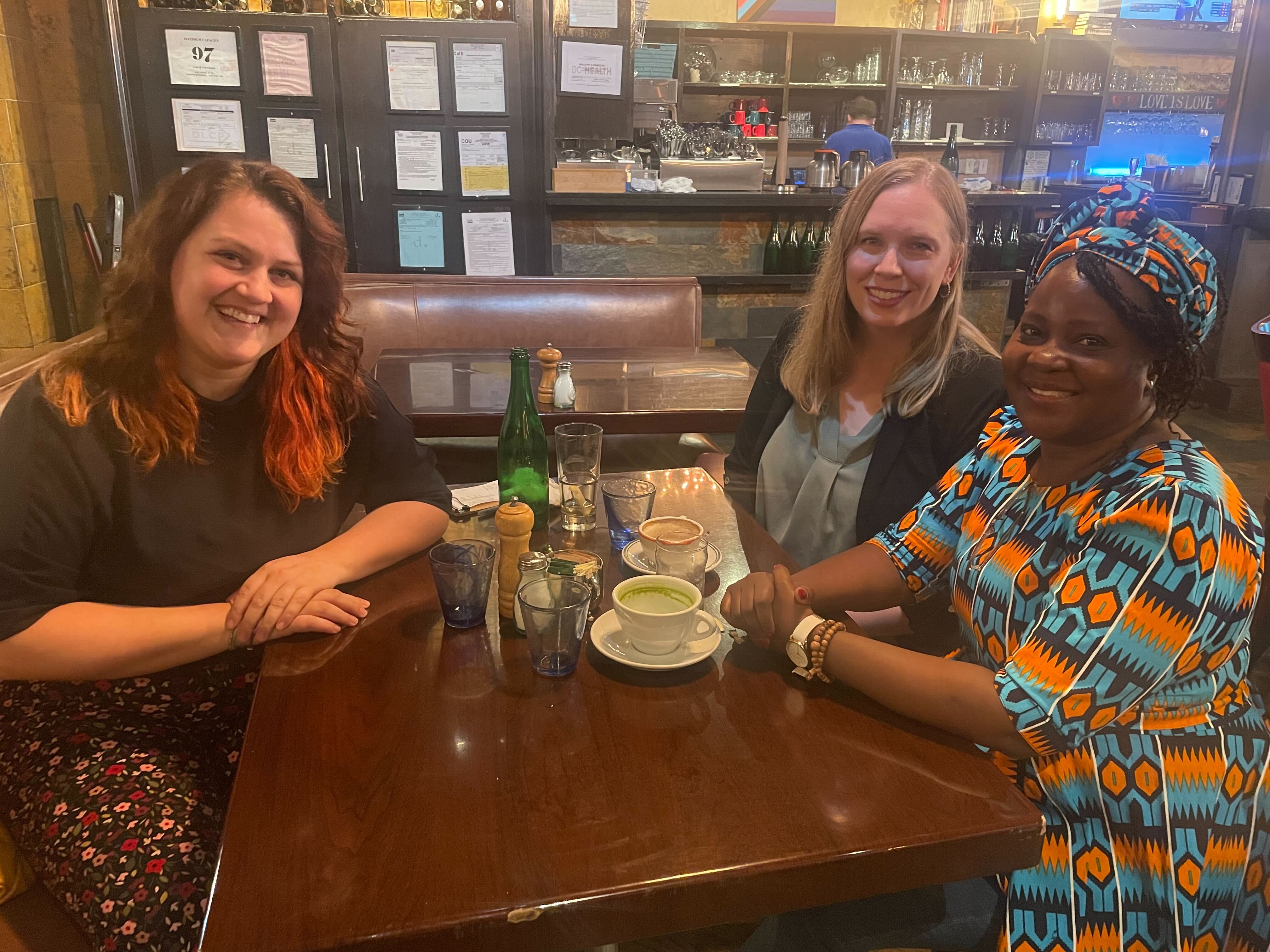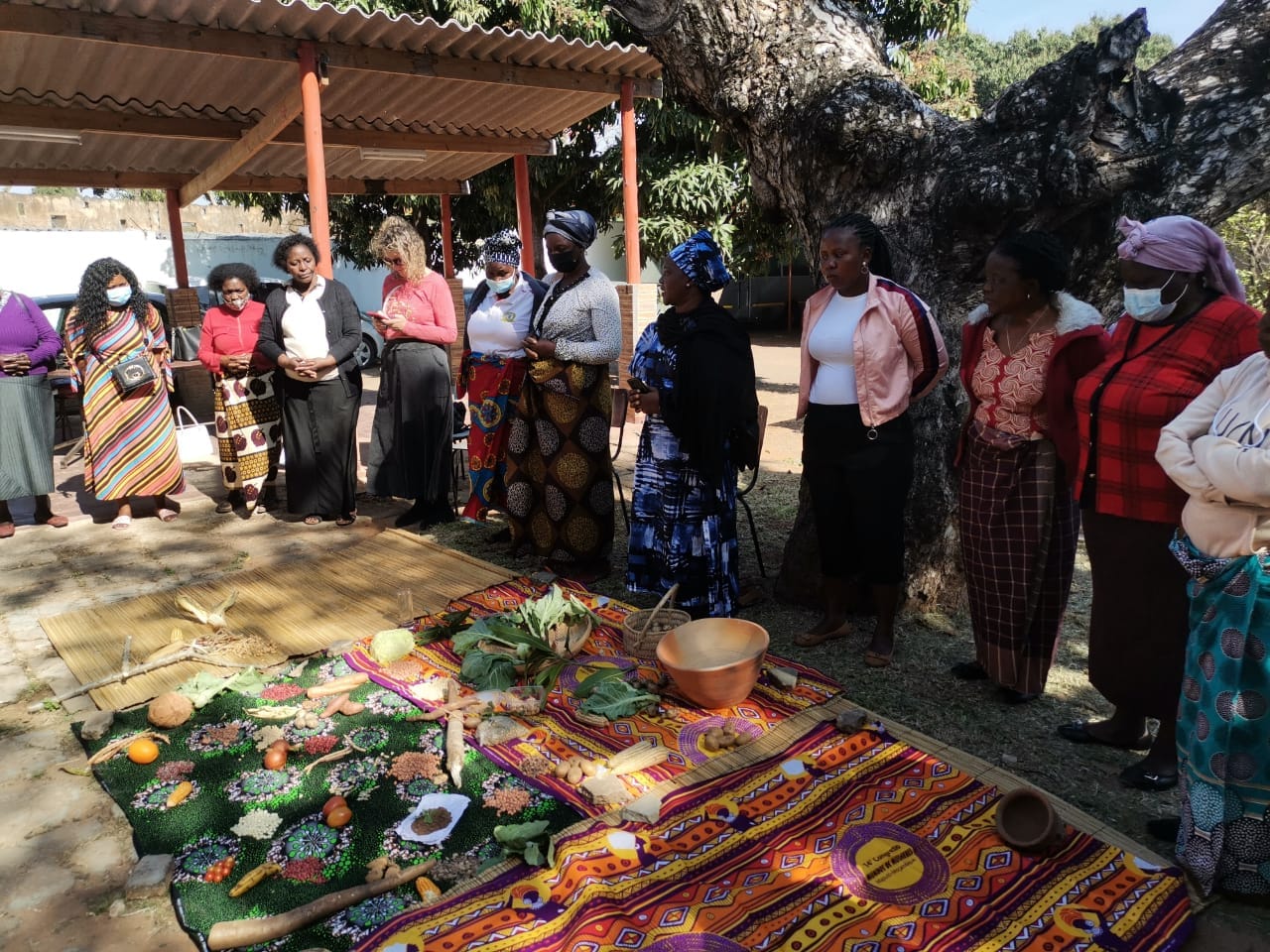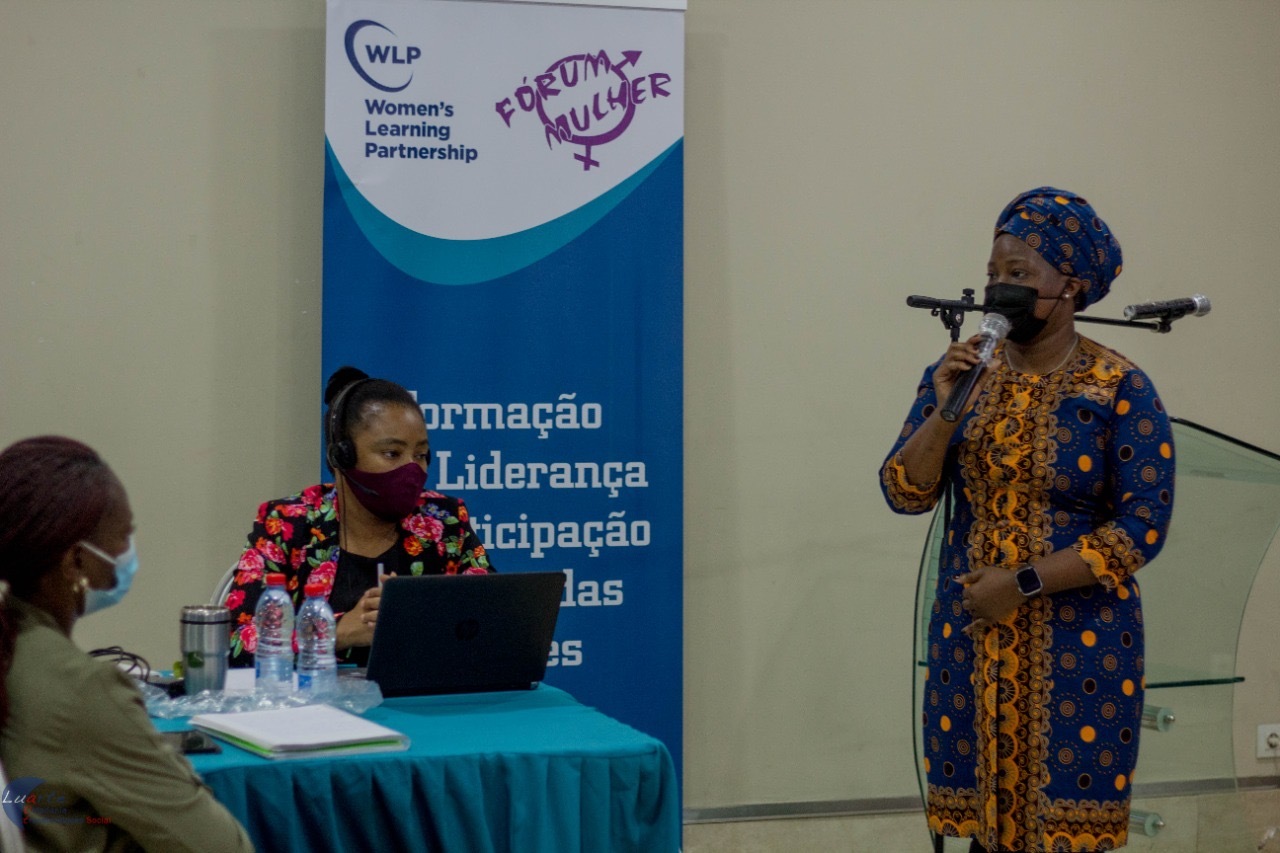
WLP Director of Programs Cait Hone, WLP Co-Executive Director Allison Horowski, and Fórum Mulher Executive Director Nzira Deus at a meeting in Washington D.C. in May 2024.
Last week, governments, development partners, civil society, scholars, and private sector representatives convened at the World Bank Land Conference in Washington DC, to discuss research, critical issues, and policy related to the land sector. This year's theme, "Securing Land Tenure and Access for Climate Action," emphasized the often-overlooked role of land tenure in climate change adaptation and mitigation. Nzira Deus, Executive Director of WLP’s partner in Mozambique, Fórum Mulher, spoke at the conference about how civil society organizations in Mozambique are bridging the gap between policy commitments and ground-level change, especially when addressing the barriers women face in accessing land rights. During her visit to DC, WLP's Director of Programs, Cait Hone, sat down with Deus to discuss the work at the intersection of climate action and gender equality and the importance of including a gendered perspective in international discussions on land rights.
In Mozambique, women account for 87.3% of the agricultural labor force, but only 25% of women are land owners who hold official user rights. This disparity is reflected across the world, where women own less than 20% of the world's land. Unequal access to land undermines women's economic stability and hampers broader development goals. Secure land tenure for women is linked to improved household welfare, food security, and environmental sustainability.

Participants sharing their connection to the land they cultivate at an event organized by Fórum Mulher.
Deus emphasized the vital connection between women and land in Africa. "Women are the majority of people working on land, and the land means a lot for them," she explained. "Land is not just a piece of space for them to work; it also means a lot in terms of cultural and social issues. In Africa, 70% of the people working on the land are women, and they depend on the land for subsistence. They feed their families, the country, and the continent.”
The intersection of land rights and women’s physical and economic security is crucial as Mozambique grapples with climate change's impacts. In Mozambique, recurrent floods and droughts devastate agricultural productivity, with women bearing the brunt of these impacts. "Since January, we have had at least four [climate] crises," Deus noted, emphasizing the disproportionate effect on women, especially in food production and gender-based violence.
She stressed the importance of supporting communities and women in adaptation efforts and engaging them in climate change conversations. "We have the capacity. Please go directly to us. Talk with us, and let's deal with this together."
Investing in women's land rights and climate leadership is not just a matter of justice but of survival and progress for entire communities. She called for aid and support following climate crises to be directed to community-level organizations, particularly those led by women. "Women have the capacity to deal with the climate crisis. Especially with support and training.” Deus emphasized that instead of organizations bringing in staff from outside the country to lead climate justice work, local women who are close to the land, and in many cases already doing this work in their communities, should be approached as partners, allies, and experts themselves.

Deus at meeting with Minister of Land and Environment to discuss the inclusion of rural women in decision-making and governance on the use of land and natural resources.
In Mozambique, Fórum Mulher steadfastly advocates for women's land rights and works with local communities to build women’s capacity to secure their rights and the rights of their communities. When the Mozambican government began reviewing its National Land Policy in 2020, Fórum Mulher raised concerns about the process weakening women’s access to land and inhibiting their participation in land management. In their meetings with policymakers, Fórum Mulher underscored how the government’s loosening of the regulations has allowed companies to usurp land from rural women and men under the guise of development. Through research, reports, coordinating with women farmers, and direct engagement with policymakers, Fórum Mulher demanded a gender quota for representation in the land policy review process, ensuring that rural women’s voices were heard and considered. The government review process is ongoing, and Fórum Mulher continues to collaborate with diverse civil society organizations and groups of women farmers to ensure that women's voices are heard in parliamentary discussions. Despite some developments in the law review process, concerns remain about the intentional inclusion of women's rights in the land agenda.
Deus highlighted the urgency of integrating women's perspectives into land policy and law discussions. "We need to remind the government that this conversation must include women's voices and consider women's concerns. It’s not enough to sit at the table and say that they heard the women, but what women say must come to be represented in the subsequent documents and plans."
During the World Bank Conference session “Transforming Land Rights for African Women and Men: Civil Society's Clarion Call for Action,” Deus connected the urgent need to secure women’s land rights at the national level to global climate action. She shared the expertise and demands of grassroots movements and local women farmers in the fight against climate change and inequalities. As Deus powerfully stated, "All policies and processes must prioritize people—prioritize women—not property." Her words remind us that true progress toward sustainability, equality, and justice requires listening to those most affected and ensuring their leadership in crafting the path forward.
Related Content
The Scariest Part of this Halloween? The Rise of Authoritarianism Haunting the World
As Halloween fills the streets with goblins, ghosts, and witches, an even more sinister specter looms on the global stage—the surge of authoritarianism. This season, the chills don’t come from haunted houses but from a dangerous trend sweeping across nations, threatening freedoms, human rights, and especially women’s rights.
Transforming Communities in Afghanistan by Investing in Women and Girls: A Conversation with Zala Ahmad
This International Day of the Girl, WLP had the honor of speaking with Zala Ahmad, advisor to WLP's Cross Border Coalitions Initiative and co-founder of Safe Path Prosperity (SPP), an incredible organization dedicated to empowering Afghan women and girls through menstrual health education and access to essential products. Operated by Afghan women, SPP produces Safepad, a locally-made reusable sanitary product, in production centers located in Kabul and Kandahar. The organization is dedicated to creating pathways to employment, prosperity, and dignity for Afghan women and girls through various initiatives, including employment opportunities, mental health support, and educational awareness programs. To date, SPP has generated over 100 jobs and distributed more than 250,000 hygiene kits to women and girls across Afghanistan. In this interview, we delve into the work of Safe Path Prosperity and the organization's vision for women's empowerment in Afghanistan. Read more about the inspirational work of SPP below.